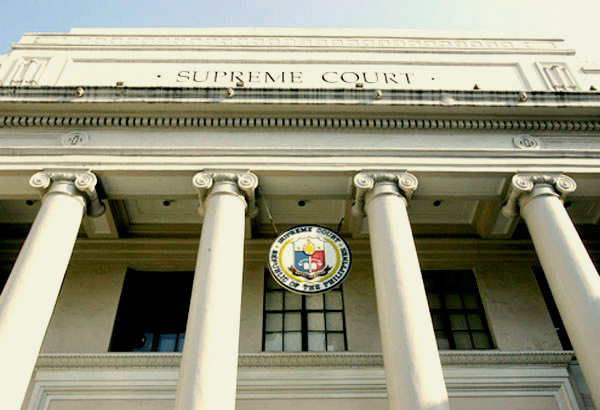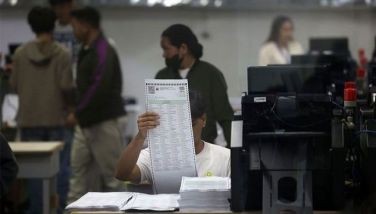SC tackles drug war: Were rights violated?

Supreme Court (SC) justices raised this question yesterday as they started hearing in oral arguments the petitions assailing the Philippine National Police (PNP)’s anti-narcotics operations that have been marred by killings of thousands of drug suspects. File
MANILA, Philippines — Does the government’s war on drugs violate rights of the people?
Supreme Court (SC) justices raised this question yesterday as they started hearing in oral arguments the petitions assailing the Philippine National Police (PNP)’s anti-narcotics operations that have been marred by killings of thousands of drug suspects.
Senior Associate Justice Antonio Carpio and Associate Justice Marvic Leonen listed several rights that could have been violated by policemen in implementing the PNP Command Memorandum Circular No. 16-2016 or “Oplan Double Barrel” and the Department of the Interior and Local Government (DILG)’s Memorandum Circular 2017-112 or the “Masa Masid” project.
During interpellation on human rights, lawyer Jose Manuel Diokno of the Free Legal Assistance Group (FLAG), one of the counsels of the petitioners, and Carpio tackled the possible violation of the right to privacy in the conduct of “Oplan Tokhang,” where policemen inspect houses to search for drug suspects.
The PNP policy being assailed allows policemen to go house to house and ask drug suspects to surrender and to conduct case buildup against those who refuse to allow them entry into households for inspection.
“When the police conduct case buildup just because you refuse entry, that violates the right to privacy because you may refuse entry, correct?” Carpio asked Diokno.
The counsel answered in the affirmative, adding that apart from the right to privacy, such policy also violates the constitutional right against unreasonable search and seizure and right to be presumed innocent until proven guilty.
Diokno, who is also dean of De La Salle University-College of Law, stressed that every “citizen has a right to refuse entry if there is no search warrant” presented by the police.
For his part, Leonen cited violations of the right against self-incrimination, the right to custodial interrogation and the right to domicile in the setup of Oplan Tokhang.
The magistrate stressed that while a court-issued search warrant is not needed for police to knock on doors, it is the “right of the occupant not to open the door.”
“They cannot barge in because that is precisely the right to domicile,” he pointed out.
Leonen also believes that the threat on those who do not open the door to policemen during Oplan Tokhang – who are already under custodial investigation at this stage – could also constitute violation of Republic Act 7945 or the anti-torture law.
“If you do not open the door, something will happen to you... When somebody is under a coercive process to make the person actually do something – as, in this case, open the door to the police, let them in (and) make them do whatever – therefore under a pain of coercion, that in fact is torture, according to the law, is that not correct?” he explained.
In the same hearing, Diokno alleged that the PNP order expressly authorizes the police to kill suspected drug pushers and replaces the police function of evidence gathering and case buildup with that of compiling lists of suspected drug personalities for the purpose of “neutralizing” them.
He further stressed that the DILG order, which establishes a system of anonymous reporting of suspected criminals, is unconstitutional as it violates the right to due process of law and to be presumed innocent.
Joel Butuyan of the Center for International Law, the other lawyer of the petitioners, also assailed the PNP and DILG orders during the oral arguments.
He lamented that the war on drugs of the Duterte administration is actually an “ongoing war against the Bill of Rights in our Constitution” as it “endanger(s) the rights to life, liberty and security of all citizens of the country.”
Chief Justice Maria Lourdes Sereno required the respondents led by PNP chief Director General Ronald dela Rosa, who are represented by the Office of the Solicitor General, to appear before the SC in the next oral arguments set for Nov. 28.
The two consolidated petitions were filed by families of 35 alleged drug suspects killed in anti-narcotics operations of police over the past year and other residents of San Andres Bukid district in Manila, families of two victims of extrajudicial killings identified as Ryan Dave Almora and Rex Appear and a survivor identified as Jefferson Soriano.
Extrajudicial killings advocate
Meanwhile, Commission on Human Rights (CHR) commissioner Roberto Cadiz said the reality of the human rights situation in the country is that President Duterte advocates extrajudicial killings.
Speaking at the forum organized by the Integrated Bar of the Philippines (IBP) in Taguig City on Monday, Cadiz criticized Duterte for supposedly mocking the rule of law.
“We now have a President who openly advocates extrajudicial killings – let us not beat around the bush on this – and who has been very successful in creating the narrative that human rights is an obstacle to his anti-drug campaign,” Cadiz said.
“Strange as it seems, a false dichotomy between human rights and the rule of law, on the one hand, and good governance, on the other, has been successfully established in the minds of many of our people,” he added.
While his allies have repeatedly stated that there is no extrajudicial killings in the country, Duterte has contradicted himself several times on the matter.
In a speech before business groups last month, the President said there is no such thing as extrajudicial killing in the country and the killings are cases of homicide or murder.
Moments later, however, he appeared to backtrack and admitted the existence of extrajudicial killings.
“Now are there extrajudicial killings? Yes, that is why on the day I saw (it on) TV, I ordered the police to detain the three policemen,” he said, referring to the case of a minor who was allegedly killed execution-style by the police.
Duterte also drew flak over his remarks that appear to order police to kill drug suspects, a statement dismissed as an exaggeration by his allies and spokespersons.
Cadiz also noted attacks against independent institutions such as the CHR, the SC and the Office of the Ombudsman through political maneuvering of the present administration.
He said the challenge to human rights defenders and lawyers is to be able to speak the truth in the present environment. – With Janvic Mateo
- Latest
- Trending































